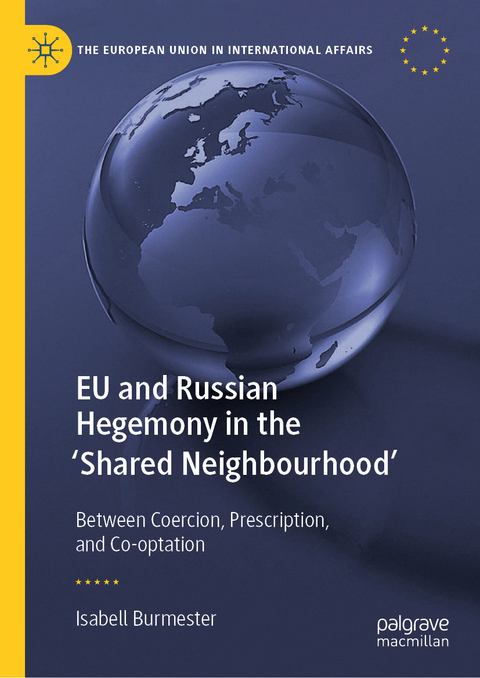
EU and Russian Hegemony in the 'Shared Neighbourhood'
Springer International Publishing (Verlag)
978-3-031-75487-6 (ISBN)
- Noch nicht erschienen - erscheint am 03.03.2025
- Versandkostenfrei innerhalb Deutschlands
- Auch auf Rechnung
- Verfügbarkeit in der Filiale vor Ort prüfen
- Artikel merken
This book examines the EU's and Russia's policies in Eastern Europe and the South Caucasus through the prism of hegemony, a concept that it applies to both regional actors. The study cross fertilises the literatures on the EU neighbourhood policy, Russia's foreign policy, and the scholarship on power in international relations to arrive at an innovative conceptualisation of the mechanisms of hegemonic power. The comparative lens of the analysis leads to novel findings that advance our understanding of the EU's and Russia's behaviour in the EU's Eastern neighbourhood. In this book, the existing, separate theorisations are subsumed under more generic terms and concepts, thereby rendering EU and Russian modes of influence comparable for empirical analysis. The comprehensive conceptual framework of hegemonic power in shared neighbourhoods is based on three ideal typical mechanisms of hegemonic influence: coercion, prescription, and co-optation. To understand the nature of EU and Russian hegemony in the region, the uses of the three mechanisms by Russia and the EU towards two neighbourhood countries are compared. The focus is laid on EU and Russian actions towards Moldova and Armenia since the beginning of the 2000s and the local perceptions of these actions. Thus, the comparative case study provides insights into the longer developments in this regional order that led to Russia's full-scale invasion of Ukraine on 24 February 2022. The book is intended for scholars and students interested in understanding the broader context of Russia's war in Ukraine. Because of its contribution to the debate on regional powers in shared neighbourhoods, it is particularly useful for researchers analysing the (changing) power dynamics and hegemonic behaviour in this regional order. Furthermore, it offers other scholars an analytical framework to work with when analysing the policies of different regional powers.
Isabell Burmester is a post-doctoral researcher at the Institute of European Studies at the Sorbonne Nouvelle University in Paris, France. Her work is situated at the intersection of international relations and area studies with a focus on international and regional hegemony. Specifically, she explores the nature of European and Russian hegemony in Eastern Europe and the South Caucasus.
Chapter 1: Introduction: Russia's war in Ukraine and the "shared neighbourhood" in a historical context.- Chapter 2: EU, Russia, and the theory of hegemonic power.- Chapter 3: EU and Russian coercion: Manipulating the cost-benefit calculations of the Moldovan and Armenian governments.- Chapter 4: EU and Russian prescription: Setting rules and standards for food safety.- Chapter 5: EU and Russia co-optation: (Re-)shaping the ideas and beliefs in the Moldovan and Armenian societies.- Chapter 6: EU and Russian hegemonic power over time: From a common neighbourhood policy towards differentiation.- Chapter 7: Conclusion and way forward: What future for the region and how we study it?.
| Erscheint lt. Verlag | 3.3.2025 |
|---|---|
| Reihe/Serie | The European Union in International Affairs |
| Zusatzinfo | Approx. 200 p. 14 illus., 1 illus. in color. |
| Verlagsort | Cham |
| Sprache | englisch |
| Maße | 148 x 210 mm |
| Themenwelt | Sozialwissenschaften ► Politik / Verwaltung ► Politische Systeme |
| Schlagworte | Armenia • Eastern Europe • Eastern Partnership • Eurasia • Eurasian Economic Union • European Neighbourhood Policy • European Union Politics • hegemony • Moldova • open access • Power • Regional Competition • Regional orders • Regional power • Russia • Shared neighbourhoods |
| ISBN-10 | 3-031-75487-5 / 3031754875 |
| ISBN-13 | 978-3-031-75487-6 / 9783031754876 |
| Zustand | Neuware |
| Haben Sie eine Frage zum Produkt? |
aus dem Bereich


